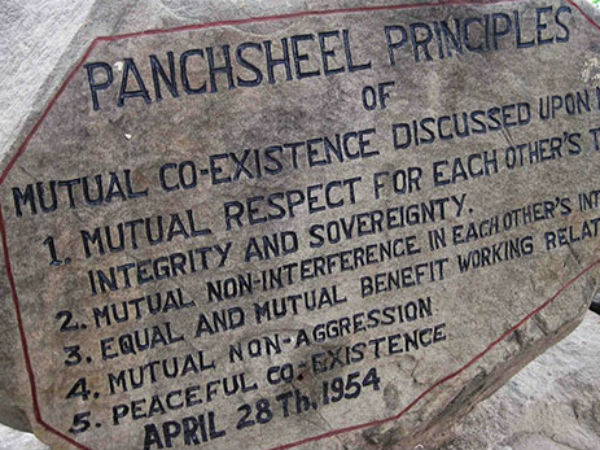
After 60 years of Panchsheel Agreement can we trust China?

Vice
President
Hamid
Ansari
who
is
on
his
first
visit
to
the
neighbouring
country
and
also
being
the
first
Indian
leader
to
visit
China
after
change
of
guard
in
New
Delhi
is
expected
to
hold
bilateral
discussions
with
his
counterpart
and
participate
in
events
to
mark
the
60th
anniversary
of
the
Panchsheel
Pact.
The
expectations
are
high
from
the
vice-president
to
raise
all
issues
of
bilateral
agenda
including
Chinese
aggression
in
Ladakh
and
Arunachal
Pradesh.
Ansari
who
will
also
be
participating
in
a
trilateral
summit
along
with
President
of
Myanmar
and
Chinese
President
Xi
Jinping
reiterated
that
the
idea
of
Panchsheel
was
based
on
universal
values.
"The
principles
are
impeccable...
the
entire
Non
Aligned
Movement
(NAM)
and
bulk
of
United
Nations
members
subscribe
to
it," he
said.
How will relations improve with change of guard in New Delhi
Sino-Indian relations are certainly at a new historical point, with a change in guard in New Delhi led by Prime Minister Narendra Modi. India and China have a mutual responsibility to enhance friendliness and harmony and expand mutually beneficial economic cooperation. Under Narendra Modi Government the two countries is also expected to strengthen cooperation mainly in the two aspects of infrastructure construction and in the manufacturing industry park.
The Prime Minister Narendra Modi who is depicted as a strong leader can certainly make a difference in India's relations with China as far as border issues are concerned. Even if mistakes occurred in the past by our leaders, being a dynamic leader Narendra Modi should not hesitate to acknowledge past mistakes and take necessary steps in the future. For example, the Aksai Chin dispute: for years, the Nehru Government knew about the construction of the road across northern Ladakh, but the common man and the Parliament were kept in the dark. The Lok Sabha got to know ‘by chance' in December 1959. Fifty-five years after the event, there is not a single declassified file on the subject.
Border dispute between India and China has been a perennial problem. 15 rounds of border talks have taken place till now but haven't bore any fruit. India says that China has illegally occupied 38,000 square kilometers of its territory in the Aksai Chin, while China claims 90,000 square kilometers in Arunachal Pradesh. Recently, Chinese platoons erected tented posts in Daulat Beg Oldi (DBO) sector in eastern Ladakh causing tensions between the two countries. China always raises its eyebrows whenever our Prime Minister or some other dignitaries visit the Arunachal Pradesh. The new NDA Government in power is definitely expected to bring bilateral relations to its best.
Panchsheel Agreement
The five principles of peaceful coexistence which was signed between India and China in 1954 met its end just three months after its signing, when Chinese troops where found violating Indian borders in Ladakh in late 1954. The agreement which was based on the five principles of mutual respect of each other's territory, mutual non-aggression were proven completely wrong in the 1962 war. Infact, a death note written by Mao Zedong before 1962 war stated that India-China relations should be based on 'armed coexistence' instead of 'peaceful coexistence' as stated in the Panchsheel Pact. The 1962 war was a humiliation for India and it had left behind a massive border dispute which is till today haunting the people of both the nations.
Panchsheel treaty met its end in just three months after its signing
Time for stronger Panchsheel Agreement
With continuous escalating tension between two nations as far as territorial dispute is concerned, it is already proved that the the Panchsheel Agreement is no more relevant and its time to revive the Agreement.
China which recently claimed Arunachal Pradesh as part of their territory has raised the temper between two countries. Other major issue that irks China is Tibet. China has objection for the presence of Tibetan spiritual leader Dalai Lama and other 150,000 Tibetans in India. The Dalai Lama maintains that he is seeking more autonomy for Tibetans, while China accuses the Dalai Lama of conspiring and wanting to split Tibet off from the rest of China. Talking of all these issues which has severely effected the two nations bilateral relations, it only shows that the Panchsheel pact only remains to be celebrated as an anniversary instead of being implemented.


 Click it and Unblock the Notifications
Click it and Unblock the Notifications


































